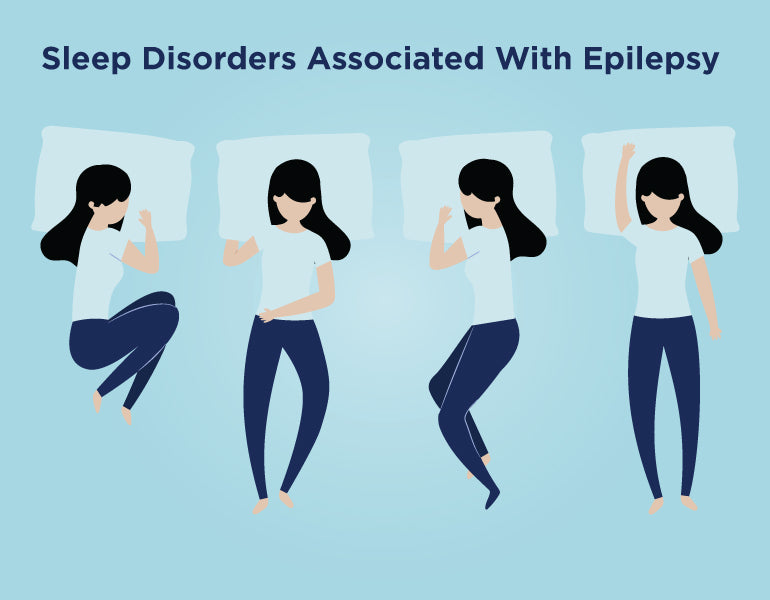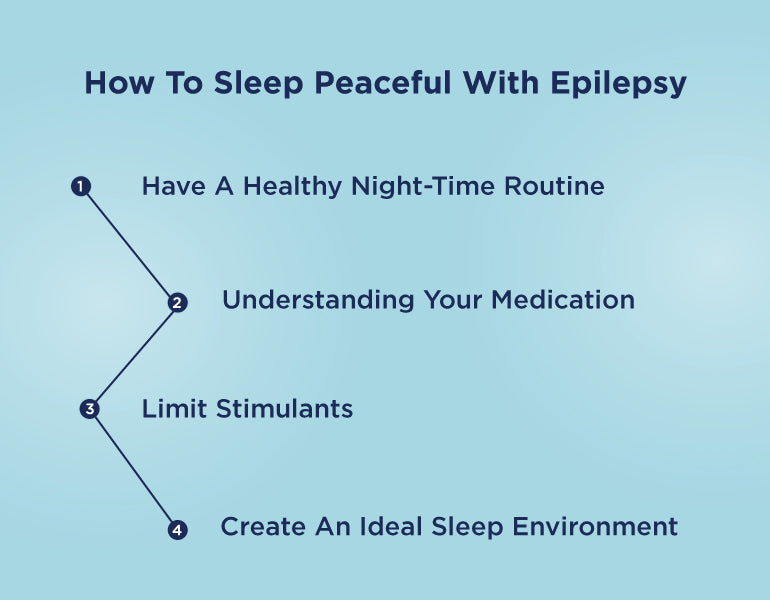My Cart

Epilepsy and Sleep: Understanding The Connection Between The Two
Almost 10 to 12 million individuals in India suffer from epilepsy. It is a neurological disorder, which causes unpredictable seizures due to an abnormal electrical activity in the brain. This leads to seizures with various symptoms and intensities when there is a brief interruption in normal functioning. However, there is a connection between sleep and epilepsy.
Epilepsy can affect sleep due to seizures or the side effects of medication. But then, poor sleep may further trigger seizures, forming a complex relationship.
In this article, we bring you everything you must know about epilepsy and sleep, and other crucial tips. Read till the end to know all about it!
Effects Of Sleep On Overall Well-Being
Let’s walk you through two scenarios. In the first one, imagine enjoying an uninterrupted sleep for seven hours straight. In the other scenario, imagine going through disturbed sleep where you hardly get to snooze for 4-5 hours.
What happens the next day? The first situation ensures you wake up with a smile on your face. Whereas, the second one makes you feel groggy and lowers your productivity.
But what happens when you don't get the sleep your body needs? Well, it can lead to weight gain, increased stress, and a higher risk of health issues.
Quality sleep is vital for your overall well-being. It not only supports your physical and mental health but also enhances your mood, memory, and concentration.
Even when suffering from a condition like epilepsy, it becomes crucial to establish a consistent sleep pattern for a healthier you!
Here’s what happens when you don’t get enough sleep:
- Difficulty concentrating and reduced attention span
- Impaired decision-making and problem-solving abilities
- Memory consolidation is compromised
- Increased irritability and mood swings
- Risk of developing anxiety and depression
- Weakened immune system
- Increased inflammation in the body
- High blood pressure and a higher risk of cardiovascular problems
- It may lead to weight gain and a higher risk of diabetes
- Impaired motor skills and coordination
- Hormonal imbalances
- Reduced performance and productivity
- Risk of microsleep
How Much Sleep Do You Need?
As they say, anything too much is bad This rule applies to sleep as well. While too little sleep is harmful, too much is also not very good for you. Some of the effects of sleeping too much include:
- Impaired cognitive function
- Mood swings
- Issues with physical health
- Increased pain sensitivity
- Impact on sleep quality
So, take a look at how much sleep you need each night:
Infants (0-3 months):
Recommended: 14-17 hours per day
Babies (4-11 months):
Recommended: 12-15 hours per day
Toddlers (1-2 years):
Recommended: 11-14 hours per day
Preschoolers (3-5 years):
Recommended: 10-13 hours per day
School-age children (6-13 years):
Recommended: 9-11 hours per day
Teenagers (14-17 years):
Recommended: 8-10 hours per day
Young adults (18-25 years) and Adults (26-64 years):
Recommended: 7-9 hours per day
Older adults (65 years and older):
Recommended: 7-8 hours per day
Understanding The Impact Epilepsy Has On Sleep
While poor sleep impacts overall well-being, it is important to understand the effects it has on epilepsy. First, people suffering from this condition find it difficult to fall asleep and tend to spend more time in bed once awake.
Also, people with epilepsy don't spend much time in the REM sleep stage.
REM is a stage in the sleep cycle where dreams often occur. In Stage 2 of REM sleep, your brain starts forming bursts of rapid brain wave activity known as sleep spindles. This helps with memory consolidation and is necessary to maintain cognitive function.
However, in people with epilepsy, the brain activity during their slumber may also be slightly different as they go through less number of sleep spindles.
Then, it is even seen that the time spent in non-REM 3 and 4 is minimal.
In Non-REM Stages 3 and 4, the body undergoes significant restoration and repair. It is the deepest sleep we experience. Muscles and tissues are repaired, and the immune system strengthens. Growth hormone is released, which helps with physical growth and development. This stage is vital for overall well-being and feeling refreshed upon waking.
Additionally, some medications used to manage epilepsy may have side effects that influence sleep. Some medications might cause drowsiness, while others can lead to insomnia or other sleep disturbances.
What’s The Connection Between Seizers and Sleep?
One of the main connections between sleep and seizures is that it can occur even when you are asleep. Known as nocturnal seizures, they can happen even when you are falling asleep or waking up. This disrupts the normal sleep cycle and leads to fatigue.
Seizures during sleep can occur because the brain goes through different stages while resting. Changes in electrical activity during these stages can trigger seizures in some people.
Infact, some have specific sleep-related triggers for seizures. For example, lack of proper sleep can be a trigger. And, it is also seen that some types of epilepsy have a nocturnal preference, meaning they tend to happen more often at night.
But that said, the impact of epilepsy on sleep goes beyond seizures. Individuals with epilepsy often find it difficult to fall asleep due to a sense of anxiety related to seizures. This further disrupts sleep by increasing stress levels.
Epilepsy In Children and Sleep
Even children suffering from epilepsy have trouble with sleep. Usually, they tend to find it difficult to fall asleep and enjoy a good night's rest. Also, for some children with epilepsy, specific sleep patterns or disruptions can trigger seizures.
When a child goes through a lack of sleep, it affects their day. They may feel tired and fatigued, and it can hamper their learning abilities and make way for behavioral issues.
However, a few tweaks in the routine can be useful. For instance, you must make sure that children with epilepsy go to bed and wake up at the same time. This regularity can help manage the condition. Along with that, it is important to create a comfortable and safe sleep environment. Make sure you work closely with your child's healthcare provider to come up with a comprehensive care plan.
Sleep Disorders Associated With Epilepsy

Let’s take a look at the common sleep disorders associated with epilepsy and how they affect you.
Insomnia
Insomnia is a condition where people find it difficult to fall asleep or stay asleep. This could be linked to anxiety about seizures or medication side effects. However, when it is not combated in time, it enhances the stress levels which can trigger seizures. Also, lack of sleep can impact mood, cognitive function, and overall well-being.
Excessive Daytime Sleepiness
Excessive daytime sleepiness may occur due to seizures or the antiepileptic drugs. This can leave you feeling overly tired during the day and impact other areas of your life. For instance, it can hamper your work and productivity. Excessive daytime sleepiness also reduces alertness and increases the risk of accidents.
Sleep Apnea
There is a bidirectional relationship between epilepsy and sleep apnea. Now, sleep apnea is a sleep disorder where breathing repeatedly stops and starts during sleep. It can lead to loud snoring, fatigue, and health issues. Epileptic seizures can sometimes lead to interruptions in breathing during sleep and contribute to sleep apnea. Also, sleep apnea may trigger or worsen seizures.
Restless Legs Syndrome (RLS)
Some individuals with epilepsy may experience RLS. It is an uncomfortable sensation in the legs that leads to an irresistible urge to move them. This condition can disrupt sleep and even exacerbate existing sleep-related seizure triggers.
Circadian Rhythm Disorders
Epilepsy can also impact the body's internal clock, which is known as the Circadian Rhythm. When this happens, there is a disruption in the cycle. Irregular sleep-wake cycles are not good as they adversely impact seizure patterns.
Medication Effects
As mentioned earlier, the medications used to manage epilepsy can sometimes affect sleep. They may cause drowsiness or hamper normal sleep patterns.
How To Sleep Peaceful With Epilepsy
Here are all the tips that can help you sleep peacefully with epilepsy. Take a look!

Have A Healthy Night-Time Routine
As you already know, poor sleep can aggravate epilepsy. Therefore, one of the best ways to correct your sleep cycle and enjoy a full night's rest is to have a proper sleep routine. Make sure you go to sleep and wake up at the same time, even on weekends and holidays.
If you are someone who has trouble falling asleep, try relaxation techniques or speak with your doctor. You can also have a soothing bedtime routine to help you out. It works because it creates a conducive environment for rest and curbs potential triggers. Some of the activities you can try include:
- Dim lights and engage in calming activities like reading
- Avoid screens before bed
- Listen to calming music
- Write in your journal
- Make your bedroom cozy and comfortable
- Practice relaxation techniques like deep breathing or gentle stretches
Understanding Your Medication
As someone with epilepsy, you must take your prescribed medication and time and consistently. You can always set a daily routine to incorporate medication intake so it becomes a habit. Missing doses or irregular schedules may compromise seizure control.
That said, if you are going through any side effects that are hampering your sleep or other areas of your life, don't simply quit taking medicines. Instead, speak to your doctor. They will make the necessary adjustments to help you out.
Limit Stimulants
Always avoid stimulants before bedtime for better sleep quality. For example, be mindful of the caffeine intake in the evening and limit screen time before sleep. These habits enable a calmer nervous system and make sure you are able to fall asleep without any disturbances.
Create An Ideal Sleep Environment
One of the reasons why sleep eludes you might be because of your sleep companions. We are talking about your pillows and mattresses. When they are unable to fetch you the desired comfort or support, you toss and turn, experiencing disturbed sleep.
Therefore, create a cozy sleep environment of your choice with the best mattress, pillows, blankets, etc. For instance, The Sleep Company's SmartGrid Technology mattress strikes the perfect balance between support and comfort so you enjoy the best sleep.
The Final Word
Now you know everything you must know about sleep and epilepsy. Remember, sleep is vital for your well-being. Not getting enough sleep only aggravates your condition. So, try the above-mentioned tips to help you enjoy a good night's snooze. However, if nothing works for you, you must speak with your healthcare provider. Address your concerns early on for a healthy you!
Further Reading
5 Signs You Need a Sleep Tracker
December 12, 2024
The Future of Sleep Trackers: Trends to Watch in Sleep Technology
December 11, 2024

Top 10 New Year Gift Ideas For Married Couples
December 03, 2024

Common Causes of Insomnia: Stress, Anxiety, and Other Triggers
November 29, 2024

What Is A Normal Sleeping Heart Rate By Age?
November 28, 2024


